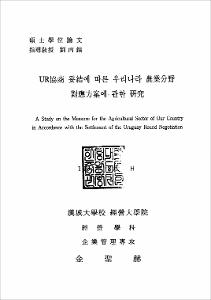UR協商 妥結에 따른 우리나라 農業分野 對應方案에 관한 硏究
- Files in This Item:
-
-
Download
 000000066458.pdf
기타 데이터 / 2.9 MB / Adobe PDF
000000066458.pdf
기타 데이터 / 2.9 MB / Adobe PDF
-
Items in Repository are protected by copyright, with all rights reserved, unless otherwise indicated.
 000000066458.pdf
기타 데이터 / 2.9 MB / Adobe PDF
000000066458.pdf
기타 데이터 / 2.9 MB / Adobe PDFItems in Repository are protected by copyright, with all rights reserved, unless otherwise indicated.